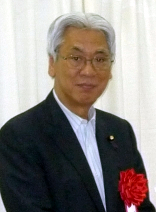Toshio Ogawa
Toshio Ogawa ( Japanese 小川 敏夫 , Ogawa Toshio ; born March 18, 1948 in Nerima , Tokyo ) is a Japanese politician ( NPS → DPJ → DFP → KDP ), a member of the Sangiin , the upper house of the national parliament , for the Tokyo prefecture and former Minister of Justice . Within the party, he belongs to the Kan group . From 2016 to 2018 he headed the upper house MPs of the Democratic Progressive Party and has been Vice President of the Sangiin since 2019.
Life
Ogawa, a graduate of Rikkyō University , first worked as an assistant judge ( saiban-jiho ) at the Shizuoka District Court from 1973 , and then as a prosecutor at the Tokyo District Prosecutor's Office from 1976. He left this in 1981 and was registered as a lawyer with the Tokyo Bar Association. In the 1980s he was also a lecturer at Rikkyō University and the Tax Academy ( zeimu daigakkō ) of the Ministry of Finance.
Ogawa entered politics in the 1990s: In the 1996 Shūgiin election , he joined the Democratic Party (English DPJ) in the 9th constituency of Tokyo , but was defeated by the incumbent Kōichi Yoshida with around 59 to 67 thousand votes New Progress Party . Two years later he received over one million votes in the 1998 Sangiin election in Tokyo Prefecture (at that time four seats per election) and thus entered the House of Lords with the highest percentage of votes; In 2004 he was re-elected with the second highest percentage of votes. In the Sangiin he was, among other things, chairman of the cabinet committee and the foreign and defense committee. After the change of government in 2009, he was chairman of the Committee on Agriculture, Forestry and Fisheries until 2010. In the 2000s he was a member of several democratic shadow cabinets, from 2011 to 2012 and from 2015 to 2016 he was Secretary General of the DPJ → DP Group in Sangiin. He is also a member of the board of directors of the DP prefecture association Tokyo.
In the campaign for the 2010 Sangiin election , Ogawa stood for the Democratic Party in Tokyo alongside the popular administration minister Renhō . In order to prevent an unfavorable distribution of the DPJ votes to both candidates, Ogawa concentrated on the democratic core electorate and the trade unions that were formerly close to the socialists / social democrats. With almost 700 thousand votes, Ogawa reached fourth place and was re-elected for another six years. In September 2010 he became Vice Minister for Justice in the reshaped Kan cabinet . In January 2012 he was appointed by Yoshihiko Noda in a cabinet reshuffle to succeed Hideo Hiraoka as Minister of Justice, and in June 2012 he was replaced by Makoto Taki in a further reshuffle .
In the Sangiin election in 2016 , he ran for the newly founded Democratic Progressive Party (DFP) again alongside Renhō, which again took first place with over 1.1 million votes (18.0%). The Tokyo prefectural constituency had been enlarged to six seats, and Ogawa achieved sixth place with only around 508,000 votes (8.2%) - with around 40,000 votes ahead of Yasuo Tanaka (7.5%) from Osaka Ishin no Quay . He then took over the chairmanship of Akira Gunji , who was elected Vice President of the Sangiin. In April 2018 he left the DFP and joined the Constitutional Democratic Party of Yukio Edano . On August 1, 2019, he was elected Vice President of the Sangiin to succeed Gunji.
Ogawa is divorced from actress Yoshie Ichige .
Web links
- Official Website (Japanese)
- Sangiin: Member Profile ( Japanese , English )
Individual evidence
- ^ Democratic Progressive Party, Tokyo Prefectural Association: Board members
- ↑ Alex Martin, Takahiro Fukada: Campaigning in Tokyo heats up. Parties pull out all the stops as 24 candidates vie for five seats. In: The Japan Times . July 6, 2010, accessed July 8, 2010 .
- ↑ Yomiuri Shimbun : Sangiin 2016 election results, majority election, Tokyo
- ↑ 【国民 民主党 結成】 民進党 、 岡田 元 副 総 理 ら 27 人 が 離 党 小川 元 法相 ら は 立憲 民主党 に 入党 届 . In: Sankei Shimbun . May 7, 2018, Retrieved December 8, 2018 (Japanese).
- ↑ Tomohiro Osaki: Opposition lawmakers with severe disabilities make Upper House debut after steps taken toward creating a barrier-free diet. In: The Japan Times . August 1, 2019, accessed August 5, 2019 .
| personal data | |
|---|---|
| SURNAME | Ogawa, Toshio |
| ALTERNATIVE NAMES | 小 川敏夫 (Japanese) |
| BRIEF DESCRIPTION | Japanese politician |
| DATE OF BIRTH | March 18, 1948 |
| PLACE OF BIRTH | Nerima |
